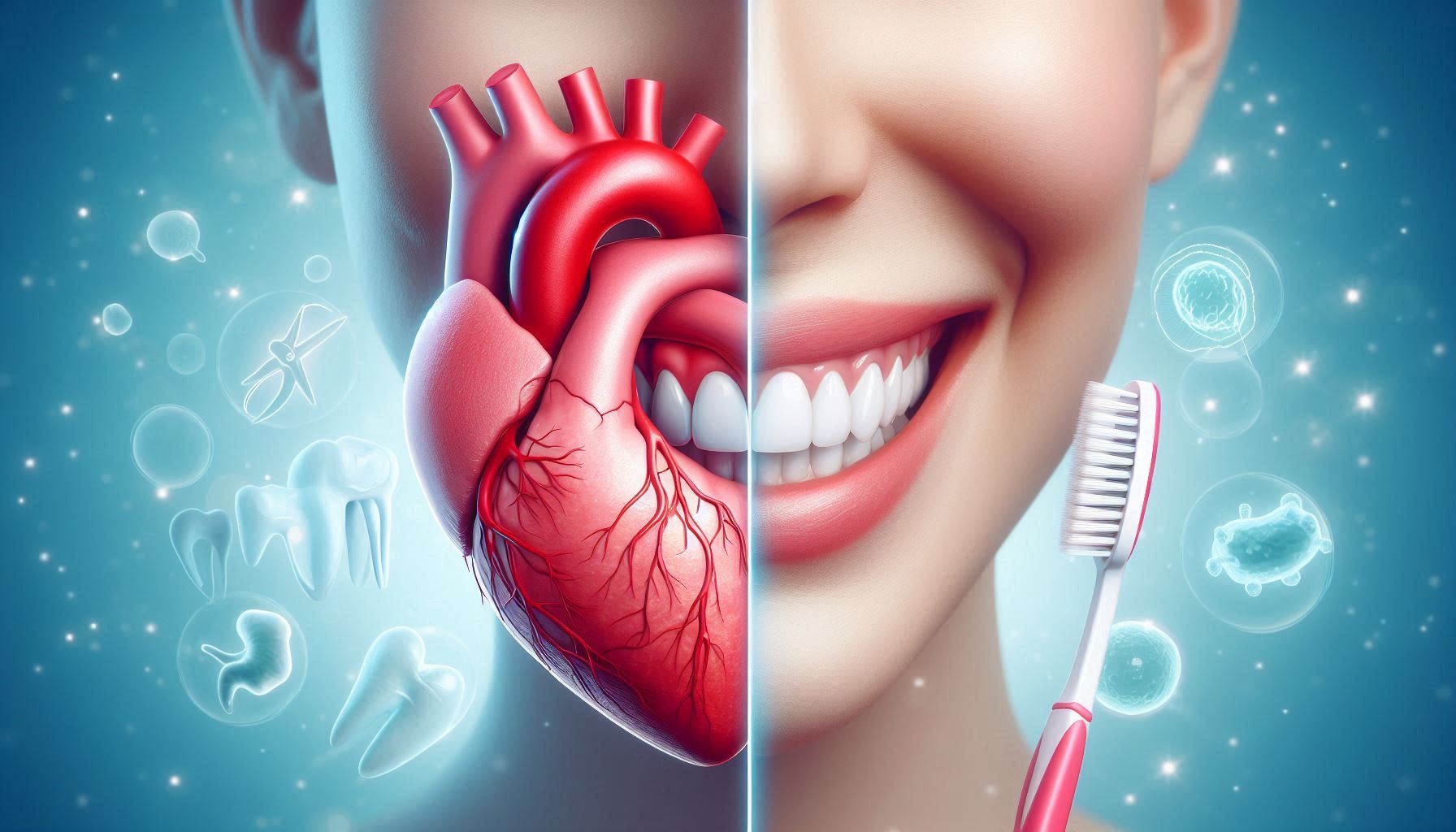Oral health has traditionally been regarded as something isolated from the overall health of the body. People typically see their dentist when they’re dealing with specific dental issues like cavities, gum disease, or tooth pain. Yet, emerging evidence underscores the critical role that the mouth plays in overall health. It’s becoming increasingly clear that oral health can influence – and even predict – the onset of numerous chronic conditions and major diseases that affect various parts of the body. The connection between oral health and systemic diseases is stronger than most people realize. For instance, poor oral health is linked to heart disease, diabetes, respiratory infections, cognitive decline, and even pregnancy complications. A healthy mouth isn’t just about having a fresh breath and a bright smile – it is a reflection of a healthy body, and taking care of your teeth and gums can have a profound impact on your overall health. This guide explores the fascinating connection between oral health and several major diseases. Through understanding how dental hygiene impacts the rest of the body, we can better grasp the significance of oral care and why regular dental visits are essential not just for aesthetic reasons but for overall well-being.
The Role of Oral Health in Systemic Health
Oral health is often considered a standalone aspect of personal care, but in reality, the state of your mouth is a reflection of your overall health. The mouth, which serves as the entryway to the body, is a key factor in the general health of your body. Neglecting oral health can have systemic consequences, and conversely, certain systemic health issues can manifest in the mouth, alerting individuals to underlying conditions. The mouth is home to a myriad of bacteria, both harmful and beneficial. Ideally, these bacteria are kept in balance through regular oral hygiene. However, poor dental hygiene can lead to an overgrowth of harmful bacteria. This imbalance has far-reaching consequences, potentially contributing to diseases in other parts of the body. When bacteria enter the bloodstream via oral tissues, it can lead to inflammation throughout the body, which plays a role in the development of several chronic conditions. For example, periodontal disease – inflammation and infection of the gums – is linked to heart disease, diabetes, and even pregnancy complications.
Moreover, diseases like diabetes can impact the condition of the gums, and untreated gum infections can worsen blood sugar control. Likewise, conditions like cardiovascular disease can result in gum inflammation or tooth loss. The reciprocal relationship between oral and systemic health highlights the importance of maintaining good oral hygiene as a means of preventing a wide range of chronic diseases.
The Link Between Oral Health and Heart Disease
One of the most surprising connections between oral health and systemic conditions is the link between gum disease (periodontitis) and heart disease. Research has demonstrated that people with gum disease are at an increased risk for heart disease, including heart attack and stroke. But how does an infection in the mouth affect the heart? The connection lies in inflammation. Periodontitis causes inflammation of the gums, and this inflammation can spread throughout the body. When the bacteria in the gums enter the bloodstream, they can attach to fatty deposits in the heart’s blood vessels, leading to the formation of blood clots, which can block blood flow to the heart or brain, causing a stroke or heart attack. Additionally, the chronic inflammation associated with gum disease can contribute to the hardening of the arteries, a condition known as atherosclerosis. The evidence is compelling: a 2013 study published in the American Heart Journal found that people with gum disease were twice as likely to suffer from heart disease compared to those with healthy gums. Furthermore, research has found that treating gum disease can improve heart health, highlighting the importance of oral care in preventing cardiovascular disease.
Diabetes and Oral Health: A Bidirectional Relationship
The relationship between oral health and diabetes is bidirectional: having poor oral health can increase the risk of developing diabetes, and diabetes can exacerbate oral health problems. This cycle is primarily due to the way that high blood sugar levels affect the body’s ability to fight infection. When blood sugar is poorly controlled, it can contribute to gum disease, dry mouth, and even tooth loss.
Gum disease, on the other hand, can make it more difficult for individuals with diabetes to control their blood sugar levels. The inflammation from periodontal disease may make it harder for the body to process insulin effectively, leading to higher blood sugar levels. Furthermore, people with diabetes are at greater risk for infections due to their compromised immune system, making them more susceptible to developing oral infections.
It’s essential for individuals with diabetes to be proactive in their oral care. Regular dental visits, consistent brushing and flossing, and controlling blood sugar levels are critical steps in preventing complications related to oral health. For people with diabetes, taking care of their gums is not just about preventing bad breath or tooth loss – it’s an integral part of managing their diabetes and overall health.
Oral Health and Respiratory Diseases
Oral health also plays a significant role in respiratory diseases such as pneumonia, chronic obstructive pulmonary disease (COPD), and bronchitis. The connection between oral health and respiratory diseases arises from the fact that bacteria in the mouth can be inhaled into the lungs, potentially causing or exacerbating infections.
In people with poor oral hygiene, bacteria from the mouth can travel to the lungs and lead to respiratory infections. This is particularly true in individuals who are hospitalized, elderly, or have weakened immune systems. Research has shown that people with gum disease are at a higher risk for pneumonia, particularly if they have underlying health conditions. Studies indicate that oral bacteria can enter the lungs through aspiration (inhalation), leading to an increased risk of pneumonia, which can be particularly dangerous in older adults.
Moreover, gum disease can also worsen existing respiratory conditions. In people with COPD, for example, the chronic inflammation from gum disease can contribute to airway inflammation, making symptoms of the condition worse.
Pregnancy and Oral Health
The relationship between oral health and pregnancy is an important one, as poor oral health during pregnancy can have significant consequences for both mother and child. Pregnant women are more susceptible to gum disease due to hormonal changes that affect the gums, making them more prone to inflammation and infection.
Gum disease during pregnancy has been linked to preterm birth, low birth weight, and even pregnancy complications like preeclampsia. In fact, research suggests that women with gum disease are twice as likely to give birth to a premature baby. The inflammation caused by gum disease may trigger the release of chemicals that induce labor prematurely. Furthermore, the bacteria associated with gum disease can enter the bloodstream, potentially affecting the developing fetus.
To prevent complications, it is essential for pregnant women to maintain good oral hygiene and visit the dentist regularly. Dentists are trained to treat pregnant women safely, and many will recommend a cleanings during pregnancy to reduce the risk of gum disease.
Oral Cancer: What Your Mouth Might Be Telling You
Oral cancer is a rising concern worldwide, and surprisingly, the early stages of oral cancer can often be detected through regular dental exams. Oral cancer, which includes cancers of the mouth, tongue, and throat, can develop due to factors such as smoking, excessive alcohol consumption, and human papillomavirus (HPV) infection.
Dentists are often the first to spot signs of oral cancer during routine exams, looking for unusual lesions, sores, or growths in the mouth. Early detection is key, as oral cancer has a high survival rate when caught early, but survival rates decline when the cancer is diagnosed at later stages.
Several risk factors contribute to the development of oral cancer. Smoking and heavy drinking are two major contributors, but the recent rise of HPV-related oral cancers has changed the landscape of oral cancer prevention. Oral sex is a known risk factor for transmitting HPV, which can infect the throat and mouth, leading to oral cancers.
To prevent oral cancer, it’s essential to avoid smoking and excessive drinking, as well as practicing safe sexual behavior. Regular dental checkups can help catch oral cancer early, increasing the chances of successful treatment.
The Gut-Heart Connection: How Oral Health Impacts Digestion
Recent research has highlighted the importance of the mouth in regulating gut health. Oral bacteria can influence the balance of microorganisms in the digestive system, which is linked to conditions like irritable bowel syndrome (IBS), Crohn’s disease, and other gastrointestinal disorders.
The bacteria in the mouth can travel down the digestive tract, potentially influencing the gut microbiome. An imbalance in this microbial community can lead to gut inflammation and digestive problems. Furthermore, oral infections such as gum disease may worsen the symptoms of inflammatory bowel diseases like Crohn’s and ulcerative colitis.
Maintaining good oral hygiene – brushing, flossing, and regular dental visits – is an essential part of supporting digestive health and ensuring that the mouth does not introduce harmful bacteria into the gut.
The Impact of Oral Health on Cognitive Function and Dementia
There is growing evidence suggesting that poor oral health may contribute to cognitive decline and increase the risk of developing conditions like Alzheimer’s disease and other forms of dementia. The link between oral health and brain health is thought to involve the inflammatory response caused by oral infections, particularly gum disease.
Research has shown that the bacteria responsible for gum disease can enter the bloodstream and travel to the brain, where they may trigger inflammation and contribute to cognitive decline. Chronic inflammation, often associated with periodontal disease, has been linked to several neurological conditions, including Alzheimer’s disease.
A recent study published in the Journal of Alzheimer’s Disease found a direct connection between the bacteria responsible for gum disease and the brain plaques associated with Alzheimer’s. While more research is needed to fully understand the mechanism, the evidence suggests that maintaining good oral health could play a role in reducing the risk of cognitive decline as we age.
The Psychology of Oral Health: A Smile That Reflects Your Mental Health
Oral health not only impacts physical health but also plays a significant role in mental well-being. A smile is often the first thing people notice about us, and dental appearance can significantly affect self-esteem. Poor oral health can contribute to social anxiety, depression, and other mental health issues, especially if individuals feel embarrassed about their smile.
The mental health effects of poor oral health extend beyond cosmetic concerns. There’s also a link between periodontal disease and depression. Studies have found that individuals with gum disease are more likely to suffer from depression, anxiety, and other psychological conditions. The relationship is thought to be twofold: the inflammation from gum disease may contribute to mental health issues, while mental health challenges may lead to poor oral hygiene and neglect.
Preventive Measures: How to Keep Your Mouth Healthy and Prevent Disease
The best way to prevent the systemic diseases associated with poor oral health is to adopt effective preventive measures. Simple steps like brushing your teeth twice a day, flossing, and using mouthwash can help maintain good oral hygiene. However, there are other important habits to consider as well.
Regular dental checkups are vital to detect and address oral health issues early on. Dental professionals can spot problems such as gum disease, cavities, or oral cancer before they become severe, making treatment easier and more effective.
A healthy diet is another essential component of oral health. Eating a balanced diet that is rich in vitamins and minerals, while low in sugary foods and drinks, can help prevent cavities and gum disease. Foods rich in calcium and vitamin D are particularly important for maintaining strong teeth.
Finally, lifestyle changes, such as quitting smoking and limiting alcohol consumption, can reduce the risk of oral health problems and associated diseases. Additionally, stress management and mental health care are crucial for maintaining both oral and overall health.
Conclusion
Oral health plays a crucial role in our overall well-being. Far from being a cosmetic concern, the state of your mouth can offer early warnings for systemic diseases, including heart disease, diabetes, and respiratory infections. By recognizing the interconnectedness between oral health and overall health, we can make informed choices about our dental care that benefit both our smile and our body.
Regular dental checkups, good oral hygiene practices, a healthy diet, and lifestyle choices are simple yet effective ways to prevent many of the chronic conditions linked to oral health. By taking care of your teeth and gums, you are investing in your long-term health and quality of life. Your smile may be telling you something important – are you listening?
SOURCES
Albandar, J. M. & Kingman, A. (2002). Gingival disease and coronary heart disease: The case for a link. Journal of Clinical Periodontology, 29(4), 103-113.
Bain, C. A. & Matthews, R. M. (2010). The effect of oral disease on cardiovascular health: A review of current evidence. Journal of Periodontology, 81(2), 261-274.
Beck, J. D., Kaufman, H. E., & Lopez, R. (2006). Periodontitis and the risk of stroke. Stroke Journal, 37(12), 2700-2705.
Bremmer, A. M., Van der Meer, M., & Klinkhamer, M. (2019). The bidirectional relationship between oral health and diabetes: Mechanisms and management. Diabetes & Metabolism Journal, 45(3), 218-225.
Chrysafides, L. & Kozak, L. K. (2011). Oral health in pregnancy and its effect on maternal and fetal outcomes. Journal of Obstetrics & Gynecology, 118(3), 610-615.
Dawson, R. W., Stewart, J. M., & Gregory, M. M. (2007). Oral health and respiratory diseases: Impact of oral pathogens in COPD patients. Chest Journal, 132(5), 1698-1705.
Genco, R. J., Grossi, S. G., & Tannenbaum, R. (2002). Periodontal disease and cardiovascular disease: Associations and mechanisms. Journal of Periodontology, 73(8), 1009-1014.
López, N. J., Guerrero, E., & Luna, L. A. (2015). Oral health, inflammation, and chronic diseases: Periodontal disease as a risk factor for systemic conditions. International Journal of Oral Science, 7(2), 73-79.
Marsh, P. D., & Martin, M. V. (2009). Oral microbiology and the relationship between oral health and disease. Microbiology, 155(12), 3460-3476.
Noble, J., & Hughes, G. R. (2010). Oral health in diabetes: The interplay of periodontal disease and blood sugar. Journal of Clinical Endocrinology, 93(6), 3496-3502.
Sjögren, P., Larsson, P. H., & Grunnet, M. (2013). Oral cancer and its links with oral health. Oral Oncology, 49(3), 249-255.
Taylor, G. W., & Harris, D. M. (2005). The association between oral health and cognitive function in elderly adults. Journal of the American Dental Association, 136(7), 936-944.
van der Putten, A. A., & Bremmer, A. M. (2017). Cognitive decline and periodontal disease: The biological link. Journal of Clinical Periodontology, 44(6), 583-594.
Weintraub, J. A., & Kaiser, R. L. (2008). The impact of periodontal disease on the systemic conditions. Journal of Periodontology Research, 43(2), 121-127.
Wong, R. K., & Paxton, L. D. (2009). Oral health and chronic disease: A comprehensive review. Journal of Clinical Dentistry, 20(5), 45-50.
HISTORY
Current Version
January 13, 2025
Written By:
SUMMIYAH MAHMOOD




